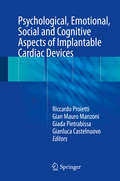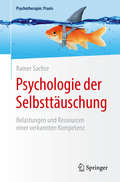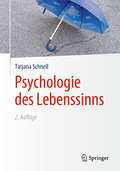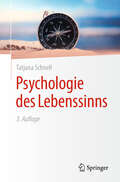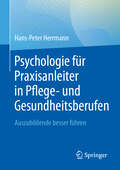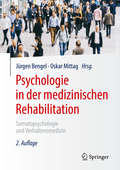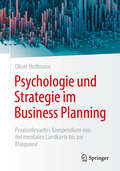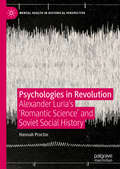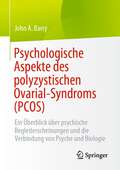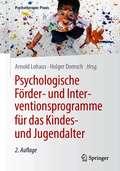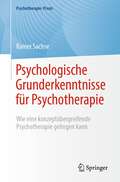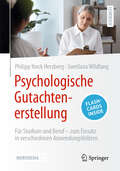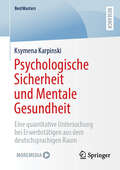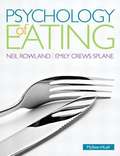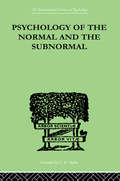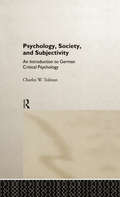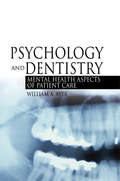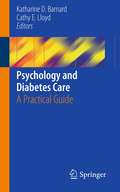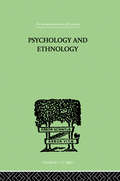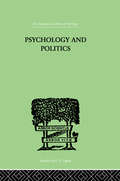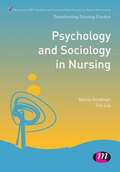- Table View
- List View
Psychological, Emotional, Social and Cognitive Aspects of Implantable Cardiac Devices
by Riccardo Proietti Gian Mauro Manzoni Giada Pietrabissa Gianluca CastelnuovoElectrical therapy of the heart has rapidly evolved over recent years with the development of the cardiac implantable defibrillator and the application of the cardiac resynchronization therapy to improve performance of the congestive failed heart. There is an impressive amount of literature produced to assess the efficacy and effectiveness of the electrical therapy. New technology is continuously introduced into the market for the treatment of electrical heart disease with optimized performance and implemented design, with approximately 600,000 new pacemakers implanted each year. Attention of the electrophysiology community has mainly focused on the biomedical aspects of electrical therapy, but the psychological, emotional, social and cognitive aspects of the implantable devices has been largely overlooked. Health-related quality of life (QoL) and, to a lesser extent, psychological disorders, i. e. anxiety and depression, have rarely been assessed as outcomes in clinical trials, and results are pointing towards the impact of the implantable devices on QoL and mental health not being direct but moderated and mediated by several biomedical as well as psychosocial variables. Furthermore, the cognitive effects of the implantable devices have rarely been assessed in empirical studies, although cognitive impairment is largely associated with the heart disorders that require implantation of an electrical device and cognitive benefits are strongly expected from the therapy. The aim of this book is to collect, appraise and condense the results of all empirical studies that have investigated, even marginally, the relationships between the implantable devices and any psychological, emotional, social and cognitive dimension. This book is a cornerstone for all involved in device utilization (physicians, nurses, technicians, industry representatives) that need to understand this topic.
Psychologie der Selbsttäuschung: Belastungen und Ressourcen einer verkannten Kompetenz (Psychotherapie: Praxis)
by Rainer SachseDieses gut lesbare Fachbuch für Psychotherapeuten und Berater klärt über ein verbreitetes Phänomen auf: Wir täuschen uns selbst, machen uns etwas vor, reden uns was ein. Die rosarote Brille hat etwas Schützendes. Selbsttäuschung trägt aber auch negative Kleider, z. B. wenn wir etwas glauben wollen, obwohl wir sehen, dass es den Fakten widerspricht. Dieses Buch zeigt auch, wie wir uns auf die Schliche kommen können und was wir davon haben, wenn wir uns mit dem Thema befassen bzw. wie wir unseren Patienten und Klienten dabei helfen können. Geschrieben für… … alle, (1) die in Therapie und Beratung selbst betroffen sind oder ihren Klienten und Patienten schneller und effektiver helfen möchten, (2) die selbst schon mal Fake News auf den Leim gegangen sind und sich für das Thema und für Persönlichkeitsentwicklung interessieren, (3) die notorische Selbsttäuscher verstehen und besser mit ihnen interagieren wollen. Der Autor: Prof. Dr. Rainer Sachse ist Psychologischer Psychotherapeut, Begründer der Klärungsorientierten Psychotherapie und Leiter des Instituts für Psychologische Psychotherapie (IPP) in Bochum. Er macht komplexe psychologische Sachverhalte allgemein verständlich und stellt sie humorvoll und einfühlsam dar.
Psychologie des Lebenssinns
by Tatjana SchnellIn diesem anregenden Fachbuch werden aktuelle wissenschaftliche Erkenntnisse zum Thema Lebenssinn greifbar und in der Praxis nutzbar. Auf der Grundlage empirischer Forschungsergebnisse erfahren die Leserinnen und Leser, welche Dimensionen von Sinn es gibt und wie man sie für sich bzw. für Klienten entdecken kann. Transdisziplinär gewonnene Einsichten zu Sinn und Gesundheit sowie Sinn in der Arbeitswelt werden dargestellt. Der Einfluss gesellschaftlicher Entwicklungen auf die Sinnfrage wird diskutiert. Ergänzende philosophische und reflektierende Selbsterkundungen machen das Lesen zu einem Erlebnis – wenn es glückt: zu einem sinnhaften Erleben. Geschrieben für psychologische und ärztliche Psychotherapeuten, Psychiater, Psychologen, Pädagogen, Berater, Organisationsentwickler, Seelsorger, interessierte Laien. Aus dem Inhalt: Sinn suchen? – Sinn definieren – Zur Erfassung von Lebenssinn – Wie entsteht Sinn? – Sinnvariationen – Lebensbedeutungen: Quellen des Lebenssinns – Die soziale Dimension des Sinns – Sinnkrise – Existentielle Indifferenz – Sinn und Glück – Sinn, Gesundheit und Krankheit – Interventionen zur Stützung der Sinnhaftigkeit – Arbeit und Sinn. Die Autorin:Prof. Dr. Tatjana Schnell forscht und lehrt zum Thema Lebenssinn am Institut für Psychologie der Universität Innsbruck (Ö) und der MF Specialized University, Oslo (NO). Auf www.sinnforschung.org geben sie und ihr Team allgemeinverständliche Einblicke in die internationale Sinnforschung.
Psychologie des Lebenssinns
by Tatjana SchnellIn diesem anregenden Fachbuch werden aktuelle wissenschaftliche Erkenntnisse zum Thema Lebenssinn greifbar und in der Praxis nutzbar. Auf Grundlage empirischer Forschungsergebnisse erfahren Leserinnen und Leser, wie Sinn persönlich und beruflich entdeckt werden kann. Sinnentstehung und Sinnerfahrung werden beschrieben und im Kontext gesellschaftlicher Entwicklungen beleuchtet. Einsichten zu existenzieller Kommunikation, Sinn in Gesundheit und Arbeit bieten praktische Relevanz. Ergänzende philosophische und reflektierende Selbsterkundungen machen das Lesen zu einem Erlebnis – wenn es glückt: zu einer sinnhaften Erfahrung. Geschrieben für Fachkräfte in Psychotherapie, Psychiatrie, Medizin, Pädagogik, Beratung, Wirtschaft, Sozialarbeit, Seelsorge, für Forschung und (Selbst-)Studium. Aus dem Inhalt: Sinn suchen? – Sinn definieren – Zur Erfassung von Lebenssinn – Wie entsteht Sinn? – Lebensbedeutungen: Quellen des Lebenssinns – Sinnvariationen – Sinn und Weltanschauung – Die soziale Dimension des Lebenssinns – Sinnkrise – Existenzielle Indifferenz – Sinn und Glück – Sinn, Gesundheit und Krankheit – Sinn und Existenz in der Praxis – Arbeit und Sinn. Die Autorin: Tatjana Schnell ist Professorin für Existenzielle Psychologie an der MF Specialized University in Oslo, Norwegen, und Fellow an der Humanistischen Hochschule Berlin. Seit über 20 Jahren erforscht sie die Frage nach dem Sinn: im Leben, in der Arbeit, in Krisenzeiten. Sie ist Direktorin des Existential Psychology Lab und gründete die Plattform Sinnmacher.
Psychologie für Praxisanleiter in Pflege- und Gesundheitsberufen
by Hans-Peter HerrmannDieses Buch bietet Praxisanleiterinnen und Praxisanleitern konkrete Lösungsansätze zu wichtigen psychologischen Themen bei der Arbeit mit Auszubildenden im Pflege- und Gesundheitsbereich. Ziel des Buches ist es, handlungsorientiertes Wissen für eine erfolgreiche und effektive Ausbildung bereitzustellen. Bei relevanten Themen wie Führung und Persönlichkeit, Strategien, Ziele und Umsetzung bei der Anleitung, geht der Autor auch auf Probleme und Konflikte ein und zeigt konkrete Lösungsansätze. Im letzten Kapitel wird gezeigt, wie Praxisanleiter und Führungskräfte Stress minimieren, ihr Selbstwertgefühl steigern und effektiv mit Kritik umgehen können. Abschließend gibt es Tipps zur Erholung und zum optimalen Nutzen von Urlaubsphasen.
Psychologie für die Gesundheitswissenschaften
by Mike Lüdmann Annette BoegerDieses Lehrbuch vermittelt die relevanten Grundlagen der Psychologie für das Studium der Gesundheits- und Pflegewissenschaften. Denn Erkenntnisse der Psychologie sind eine wichtige Basis für die Arbeit in verschiedenen Gesundheitsberufen: Sie fördern das Verständnis für menschliches Verhalten und geben praktische Hilfen für den Umgang mit Menschen an die Hand. Und so spielen sie bereits im Studium eine wichtige Rolle. Die Autoren bringen ihre langjährige Erfahrung in der psychologischen Lehre für „Psychologiestudierende im Nebenfach“ ein und vermitteln die Inhalte kurzweilig und didaktisch aufgelockert - mit vielen Beispielen, Abbildungen, Übungen, Lernfragen, Cartoons etc. „Trockene Theorie“ wird regelmäßig mit Alltagsfragen aus dem Berufsleben verknüpft. Auf einer Begleitwebsite auf lehrbuch-psychologie.springer.com finden sich zusätzliche kostenlose Lernmaterialien wie ein Glossar, Lernkarten und Verständnisfragen.
Psychologie in der medizinischen Rehabilitation: Somatopsychologie und Verhaltensmedizin
by Jürgen Bengel Oskar MittagDieses Buch ist das Lehrbuch zur Psychologie in der medizinischen Rehabilitation für alle Berufsgruppen. Es ist für Reha-Psychologen und klinische Psychologen als Basisbuch verwendbar. Als Praxishandbuch enthält es alle Informationen, die in der medizinischen Rehabilitation gebraucht werden, und dient als Begleitbuch zur Fortbildung „Fachpsychologe in der Rehabilitation“. Geschrieben für Psychologen in der medizinischen Rehabilitation sowie für Ärzte, Ergo- und Physiotherapeuten, Sportlehrer, Pflegekräfte sowie Studierende mit Ziel Masterabschluss Psychologie. Aus dem Inhalt: Grundlagen (u. a. Geschichte, Selbstverständnis, Krankheitsbewältigung) – Diagnostik und Dokumentation (u. a. psychische Komorbidität, berufliche Belastungen, Entlassbericht) – Psychologische Interventionen (u. a. Beratung, motivierende Gesprächsführung, Handlungs- und Bewältigungsplanung) – Themenspezifische Maßnahmen (u. a. MBOR, Stressbewältigung, Entspannungsverfahren, Schmerzbewältigung, Nichtrauchertraining, Gewichtsreduktion, komorbide Suchtprobleme) – Spezifische Versorgungssettings (Orthopädie, Kardiologie, Psychoonkologie, Psychodiabetologie, Neuropsychologie) – Nachsorge, Team, Forschung (u. a. Teamentwicklung, Qualitätsmanagement). Die Herausgeber: Prof. Dr. phil. Dr. med. Jürgen Bengel (Dipl.-Psych., Arzt, Psychotherapeut) und Prof. Dr. rer. nat. Oskar Mittag (Dipl.-Psych., Psychotherapeut), Universität Freiburg.
Psychologie und Strategie im Business Planning: Praxisrelevantes Kompendium von der mentalen Landkarte bis zur Blaupause
by Oliver HoffmannEin Business Plan ist weit mehr als nur ein strukturiertes Dokument: Er ist ein mentales Werkzeug, das die Denkweise, Risikobereitschaft und strategische Anpassungsfähigkeit eines Unternehmers reflektiert. Denn erfolgreiches Business Planning erfordert nicht nur eine fundierte Marktanalyse und präzise Finanzplanung, sondern auch ein Verständnis der psychologischen Mechanismen, die unternehmerische Entscheidungen beeinflussen. Business Planning ist nicht nur Strategie, sondern Psychologie. Kognitive Verzerrungen, emotionale Entscheidungsprozesse und unbewusste Annahmen prägen maßgeblich, wie realistisch und umsetzbar ein Plan ist. Ein Business Plan ist eine mentale Landkarte: Er dient nicht nur als wirtschaftliche Prognose, sondern als Orientierungshilfe in einem unsicheren Umfeld. Rationalität vs. Emotionen im Business Planning: Systematische Denkfehler wie Optimismus-Bias oder Verlustaversion beeinflussen, wie Risiken und Chancen eingeschätzt werden. Flexibilität und psychologische Widerstandskraft sind entscheidend: Ein starrer Plan ist wertlos, wenn er nicht die Fähigkeit zur Anpassung in dynamischen Märkten mit einbezieht. Investoren und Partner investieren in Menschen, nicht nur in Zahlen: Eine überzeugende Vision, ein reflektiertes Risikomanagement und ein realistisches Geschäftsmodell sind ausschlaggebend für Vertrauen und Erfolg. Das Buch zeigt, wie Business Planning methodisch funktioniert und wie es bewusst psychologisch optimiert werden kann, um Denkfallen zu vermeiden, bessere Entscheidungen zu treffen und langfristig unternehmerischen Erfolg zu ermöglichen. Die Zielgruppen • Existenzgründer und Start-up-Unternehmer • Unternehmer • Investoren und Business Angels • Manager und Führungskräfte <p s
Psychologies in Revolution: Alexander Luria’s 'Romantic Science' and Soviet Social History (Mental Health in Historical Perspective)
by Hannah ProctorThis book situates the work of the Soviet psychologist and neurologist Alexander Luria (1902-1977) in its historical context and explores the 'romantic' approach to scientific writing developed in his case histories. Luria consistently asserted that human consciousness was formed by cultural and historical experience. He described psychology as the ‘science of social history’ and his ideas about subjectivity, cognition and mental health have a history of their own. Lines of mutual influence existed between Luria and his colleagues on the other side of the iron curtain, but Psychologies in Revolution also discusses Luria’s research in relation to Soviet history – from the October Revolution of 1917 through the collectivisation of agriculture and Stalinist purges of the 1930s to the Second World War and, finally, the relative stability of the Brezhnev era – foregrounding the often marginalised people with whom Luria’s clinical work brought him into contact. By historicising science and by focusing on a theoretical approach which itself emphasised the centrality of social and political factors for understanding human subjectivity, the book also seeks to contribute to current debates in the medical humanities.
Psychologische Aspekte des polyzystischen Ovarial-Syndroms (PCOS): Ein Überblick über psychische Begleiterscheinungen und die Verbindung von Psyche und Biologie
by John A. BarryDieses Buch bietet einen Überblick über die neuesten Erkenntnisse zu den psychologischen Aspekten des polyzystischen Ovarsyndroms (PCOS) und ebnet den Weg für Fortschritte in diesem sich rasch entwickelnden Bereich. Anhand eines evidenzbasierten Ansatzes erläutert das Buch, wie PCOS Ängste und Depressionen verursacht, die Lebensqualität beeinträchtigt und mit anderen psychologischen Problemen einhergeht. Die psychologischen Auswirkungen der wichtigsten Merkmale von PCOS werden ebenfalls untersucht, wobei ein besonderer Schwerpunkt auf Insulinresistenz/Diabetes und Fruchtbarkeitsfragen liegt. Das Buch schließt mit einem Kapitel über praktische Empfehlungen, wie man am besten mit Angst und Depression bei PCOS umgeht. Ein wichtiges Merkmal dieses Buches ist, dass es aufzeigt, wie sich Testosteron, ein charakteristisches Merkmal von PCOS, auf die Psychologie auswirkt. Damit füllt es eine Lücke in der aktuellen Forschung und zeigt auf, auf welch komplexe Weise die Biologie die Psychologie bei PCOS beeinflusst und wie die Psychologie genutzt werden kann, um die Biologie positiv zu beeinflussen. Das Buch richtet sich insbesondere an Wissenschaftler und Kliniker in den Bereichen Gesundheitspsychologie und Frauengesundheit.
Psychologische Förder- und Interventionsprogramme für das Kindes- und Jugendalter (Psychotherapie: Praxis)
by Holger Domsch Arnold LohausDer Markt der Trainings- und Förderprogramme im Kindes- und Jugendbereich ist unübersichtlich. Dieses Buch ist eine unverzichtbare Entscheidungshilfe. Die Herausgeber haben ein Team aus Top-Experten zusammengebracht, das die wichtigsten Verfahren in allen Problembereichen ausgewählt und beschrieben hat. Alle Programme werden nach einem einheitlichem Schema knapp und präzise vorgestellt: Auf einen kurzen Steckbrief folgen die Beschreibung der Zielgruppe, der Rahmenbedingungen, des Konzepts, des Ablaufs sowie Materialien und Befunde zur Wirksamkeit.
Psychologische Grunderkenntnisse für Psychotherapie: Wie eine konzeptübergreifende Psychotherapie gelingen kann (Psychotherapie: Praxis)
by Rainer SachseDieses Buch lädt Psychotherapeutinnen und Psychotherapeuten in Klinik und Praxis, in Ausbildung oder mit langer Erfahrung, ein, das eigene Vorgehen zu reflektieren und aus der Kenntnis psychologischer Konzepte und Forschungen zu modifizieren und zu erweitern. Dadurch soll erreicht werden, dass Therapeuten Klienten ein besseres Therapie-Angebot machen können. So sehr es manchmal hilfreich sein kann mit überschaubaren Modellen zu arbeiten, so sinnvoll kann es sein, das eigene Handeln in eine übergreifende Rahmenkonzeption einbetten zu können – reflektiert, selbstfürsorglich, am Klienten orientiert. Aus dem Inhalt: Grundlegende Fragen zur Psychotherapie-Konzeption. Praktische Probleme und Vorgehensweisen in der Psychotherapie. Grundprobleme von Klienten: auf welche psychologischen Aspekte können Psychotherapeutinnen und Psychotherapeuten achten und welche (Prozess-)Ziele können sie sinnvoll anstreben. Über den Autor: Prof. Dr. Rainer Sachse ist Psychologischer Psychotherapeut, Begründer der klärungsorientierten Psychotherapie und Leiter des Instituts für Psychologische Psychotherapie (IPP) in Bochum; hier stellt er Grundannahmen über Psychotherapie auf den Kopf und lädt ein, zu gemeinsamen theoretischen Wurzeln der Psychologie zurückzukehren – mit Blick auf Konzeptübergreifendes, pro Klient und Klientin.
Psychologische Gutachtenerstellung: Für Studium und Beruf – zum Einsatz in verschiedenen Anwendungsfeldern
by Philipp Yorck Herzberg Swetlana WildfangDieses einzigartige Lehrbuch ist unverzichtbar für Psychologiestudierende sowie für Professionals, die sich mit der psychologischen Gutachtenerstellung beschäftigen. Darin finden Sie eine systematische Übersicht und Anleitung zur Gutachtenerstellung in den wichtigsten Anwendungsfeldern der psychologischen Begutachtung. Hier erfahren Sie alle relevanten Aspekte für die Gutachtenerstellung, wie Grundlagen, rechtliche Rahmenbedingungen, Verfahren und diagnostische Strategien sowie Entscheidungsmodelle. Ein besonderes Highlight ist die detaillierte Darstellung der spezifischen Nuancen der diagnostischen Anwendungsfelder wie Eignungsdiagnostik, Klinische und Pädagogische Psychologie, Begutachtung in der Rechts- und Verkehrspsychologie sowie Sachverständigengutachten für das Familiengericht bezüglich Sorge- und Umgangsrechtsfragen. Alles wird mit vollständigen Beispielgutachten veranschaulicht. Die Autoren, beide seit über zwei Jahrzehnten mit der psychologischen Gutachtenerstellung vertraut, teilen ihr profundes Wissen und ihre Erfahrung aus zahlreichen Lehrveranstaltungen sowie der Erstellung zahlreicher Gutachten zu einer Vielzahl unterschiedlicher Fragestellungen. Ihre Erkenntnisse und Rückmeldungen aus Lehre und Praxis haben sie dazu inspiriert, ihre Expertise in diesem Lehrbuch für Studierende, Psychologen und auch diejenigen, die psychologische Gutachten nutzen (wie Richter, Anwälte, Familienmediatoren und andere nichtpsychologische Auftraggeber), zugänglich zu machen.
Psychologische Sicherheit und Mentale Gesundheit: Eine quantitative Untersuchung bei Erwerbstätigen aus dem deutschsprachigen Raum (BestMasters)
by Ksymena KarpinskiKsymena Karpinski zeigt anhand ihrer quantitativen Untersuchung des Zusammenhangs zwischen psychologischer Sicherheit und mentaler Gesundheit bei Erwerbstätigen unter Berücksichtigung soziodemografischer und berufsbezogener Faktoren, dass die psychologische Sicherheit einen signifikanten Einfluss auf die mentale Gesundheit hat. Im Mittelpunkt steht die systematische Untersuchung dieses Zusammenhangs auf der Basis einer fundierten Definition zur psychologischen Sicherheit sowie zur mentalen Gesundheit, bestehend aus dem sozialen, eudämonistischen und hedonistischen Wohlbefinden sowie der allgemeinen Lebenszufriedenheit. Es handelt sich um die erste Untersuchung der Bedeutung der psychologischen Sicherheit für die mentale Gesundheit im deutschsprachigen Arbeits- und Organisationskontext. Die Arbeit unterstreicht anhand der theoretischen Grundlagen, dass ein Arbeitsumfeld, das die mentale Gesundheit fördert, nicht nur zum Wohlbefinden der Mitarbeitenden beiträgt, sondern auch die Produktivität steigert und dass die psychologische Sicherheit die Teamarbeit und die Freisetzung der Potentiale von Mitarbeitenden und Organisationen wesentlich fördert.
Psychology And Education
by Robert Morris OgdenRoutledge is now re-issuing this prestigious series of 204 volumes originally published between 1910 and 1965. The titles include works by key figures such as C.G. Jung, Sigmund Freud, Jean Piaget, Otto Rank, James Hillman, Erich Fromm, Karen Horney and Susan Isaacs. Each volume is available on its own, as part of a themed mini-set, or as part of a specially-priced 204-volume set.
Psychology Of Eating
by Emily Crews Splane Neil RowlandPsychology of Eating provides a multi-disciplinary overview to the study of eating; it examines current research in biology, nutrition, psychology, and more. The text's balance of major theories, historical and current research, and real-life examples enables students to understand and interact with the material presented.
Psychology Of The Normal And The Subnormal (International Library Of Psychology Ser. #Vol. 7)
by Goddard, Henry HerbertThis is Volume VII in a series of nineteen on Abnormal and Clinical Psychology. Originally published in 1919, this study from twelve years of research looks at offering a more graphical view mental processes. Psychology is the science of mind; and mind determines human conduct. It would seem therefore highly desirable that the science of mind should be so formulated as to contribute to useful behaviour.
Psychology Society & Subject
by Charles W TolmanOne result of the European student movements of the late 1960s was a critique of the mainstream, bourgeois social sciences. They were seen as irrelevant to the real needs of ordinary people and as practically and ideologically supporting oppression. The discussions around psychology in Berlin at the time became increasingly focused on whether the discipline could in fact be reformed. Among the latter was a group under the leadership of Klaus Holzkamp at the Free University who undertook an intensive critique of psychology with a view to identifying and correcting its theoretical and methodological problems and thus laying the groundwork for a genuine ‘critical’ psychology. Psychology, Society, and Subjectivity relates the history of this development, the nature of the group’s critique, its reconstruction of psychology, and its implications for psychological thought and practice. It will be of interest to anyone keen on making psychology more relevant to our lives.
Psychology and Covid-19 in the Americas: Volume 1
by Miguel Gallegos Melissa L. Morgan Nelson PortilloThis book is the first of two volumes that bring together the works presented at the congress "Contributions of Psychology to COVID-19", organized by the Interamerican Society of Psychology in 2020. This was one of the first virtual international meetings on psychology and COVID-19 in the world and brought together researchers and professionals from South, Central and North America in a single online event. The content of both volumes includes many of the first issues addressed by researchers, scholars, and practitioners across the Americas at the start of the pandemic – before vaccines, before knowledge of treatment and impact, before our worlds and daily lives were forever changed. Chapters in the first volume focus on the impacts of the pandemic in mental health, social and family dynamics, educational processes and the work of health professionals. Chapters in the second volume are dedicated to studies addressing the impacts of the pandemic in vulnerable populations; proposals of psychological interventions to deal with the distress caused by COVID-19; strategies of coping, resilience and adaptation; and the development of psychological instruments of measurement and assessments during the pandemic. The content of these two volumes marks a baseline for the collective work initiated by psychologists who came together to answer the call to combat the pandemic across the Americas. In that sense, both volumes are truly a “snapshot in time” that could help us assess in the future how much progress we have made to apply psychology to the pressing demands of our time.
Psychology and Covid-19 in the Americas: Volume 2
by Miguel Gallegos Melissa L. Morgan Nelson PortilloThis book is the second of two volumes that bring together the works presented at the congress "Contributions of Psychology to COVID-19", organized by the Interamerican Society of Psychology in 2020. This was one of the first virtual international meetings on psychology and COVID-19 in the world and brought together researchers and professionals from South, Central and North America in a single online event.The content of both volumes includes many of the first issues addressed by researchers, scholars, and practitioners across the Americas at the start of the pandemic – before vaccines, before knowledge of treatment and impact, before our worlds and daily lives were forever changed. Chapters in the first volume focus on the impacts of the pandemic in mental health, social and family dynamics, educational processes and the work of health professionals. Chapters in the second volume are dedicated to studies addressing the impacts of the pandemic in vulnerable populations; proposals of psychological interventions to deal with the distress caused by COVID-19; strategies of coping, resilience and adaptation; and the development of psychological instruments of measurement and assessments during the pandemic. The content of these two volumes marks a baseline for the collective work initiated by psychologists who came together to answer the call to combat the pandemic across the Americas. In that sense, both volumes are truly a “snapshot in time” that could help us assess in the future how much progress we have made to apply psychology to the pressing demands of our time.
Psychology and Dentistry: Mental Health Aspects of Patient Care
by William Ayer, Jr.Learn to build successful working relationships with your patientsPsychology and Dentistry: Mental Health Aspects of Patient Care is a practical guide to an often-neglected aspect of dentistry-the contributions of the behavioral sciences to dental research and practice. Dr. William A. Ayer, Professor of Behavioral Sciences at Nova Southeastern University College of Dental Medicine in Fort Lauderdale, Florida, presents a comprehensive textbook that&’s an essential study aid for students preparing for their National Dental Board Examinations and a valuable classroom resource for dental school faculty. This unique book identifies the everyday concerns of dentists, dental students, and dental hygienists, offering proven strategies for patient management and for building-and maintaining-a successful dentist-patient relationship.Psychology and Dentistry examines the contributions of the behavioral sciences to the practice of dentistry, drawing subject matter from a wide range of disciplines that include psychology, sociology, education, anthropology, economics, epidemiology, health services, and public health. The book is a practical guide to developing the necessary skills to conduct effective patient interviews, for teaching patients to manage their dental fears and anxieties, and for dealing with patients who need counseling from mental health professionals. It also addresses special issues that have become relevant to dentists and their staffs in recent years, including child abuse and neglect, spousal violence, elder abuse, aging and changes associated with age, death and dying, and bereavement. Psychology and Dentistry examines: behavior therapies behavioral interventions management techniques for patients with acute and/or chronic pain how to train patients to manage their oral habits how to get patients to comply with health care recommendations pain perception and pain expression the therapeutic use of hypnosis how to make psychological referrals for patients the effect of stress on dentists and dental students and much more!Psychology and Dentistry: Mental Health Aspects of Patient Care is an essential resource for anyone working in the dental field. The book&’s practical approach and unique insights are invaluable for helping you develop healthy relationships with your patients.
Psychology and Diabetes Care
by Katharine D. Barnard Cathy E. LloydPsychology and Diabetes Care: A Practical Guide is a concise handbook for the practicing diabetes clinician who is interested in gaining a better understanding of his patients, and in learning simple skills and tips to manage patients more effectively. It identifies and explores key psychological interventions in diabetes care in order to help healthcare professionals support their patients effectively. Edited by an expert on the psychology of diabetes, and with contributions from a group of specialists in diabetes psychology, this book contains a myriad of insights into how to understand and treat the type 1 or type 2 diabetes patient.
Psychology and Ethnology (International Library Of Psychology Ser. #Vol. 36)
by W H RiversFirst published in 1999. Routledge is an imprint of Taylor & Francis, an informa company.
Psychology and Politics: And other Essays (International Library Of Psychology)
by Rivers, W H RFirst published in 1999. Routledge is an imprint of Taylor & Francis, an informa company.
Psychology and Sociology in Nursing
by Tim Ley Mr Benny GoodmanThis book explores the sociology and psychology relevant to nursing and explains why it is so important to understand these subjects in order to be a good nurse. It has been written specifically for nursing students, and explains clearly the key concepts in both disciplines that they need to grasp. Chapters move from the individual to wider societal issues and look at the psychological and sociological basis of professional values, interpersonal relationships, nursing practice, decision making, leadership and management and teamworking. Each of the fields of nursing are explored to show the specific application of these disciplines to each.
